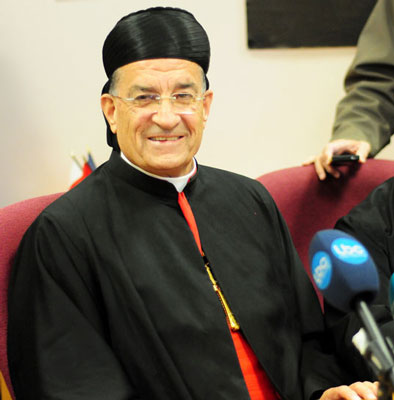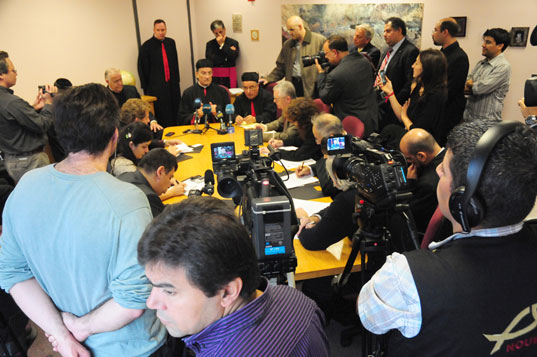This is pretty big news:
Recalling his trip to Lebanon and inviting the whole Church to remember the problems of and the Christian communities in the Middle East in their prayers, the Holy Father has invited―through his cardinal secretary of state―His Beatitude Bechara Boutros Rai, O.M.M., Patriarch of Antioch of the Maronites, to prepare the texts for the Via Crucis on Good Friday at the Colosseum. Under the guidance of the Patriarch, the texts will be prepared by two young Lebanese and will follow the traditional pattern of the fourteen stations.
I had the privilege of meeting Cardinal Rai in 2011, when he stopped by our office in New York to meet the press. (That’s Your Humble Blogger in the snapshot below, on the right, next to the patriarch’s translator, pen in hand…looking oh-so-serious…)
Cardinal Rai also figured prominently in the pope’s recent trip to Lebanon. I have no doubt his reflections of the road to Calvary will reflect, too, the struggles and sufferings of the Christians in the Middle East. It’s a great gesture of solidarity by the Pope—and further affirmation of the esteem he feels for our Eastern tradition.
The Way of the Cross at the Colosseum, meantime, has a long and storied history. The most famous recent contributor to this tradition was then-Cardinal Joseph Ratzinger, who wrote the meditations in 2005, in the waning days of John Paul’s papacy, just weeks before his own election as pope. Of the Ninth Station, when Jesus falls the third time, Cardinal Ratzinger wrote:
What can the third fall of Jesus under the Cross say to us? We have considered the fall of man in general, and the falling of many Christians away from Christ and into a godless secularism. Should we not also think of how much Christ suffers in his own Church? How often is the holy sacrament of his Presence abused, how often must he enter empty and evil hearts! How often do we celebrate only ourselves, without even realizing that he is there! How often is his Word twisted and misused! What little faith is present behind so many theories, so many empty words! How much filth there is in the Church, and even among those who, in the priesthood, ought to belong entirely to him! How much pride, how much self-complacency! What little respect we pay to the Sacrament of Reconciliation, where he waits for us, ready to raise us up whenever we fall! All this is present in his Passion. His betrayal by his disciples, their unworthy reception of his Body and Blood, is certainly the greatest suffering endured by the Redeemer; it pierces his heart. We can only call to him from the depths of our hearts: Kyrie eleison – Lord, save us (cf. Mt 8: 25).













